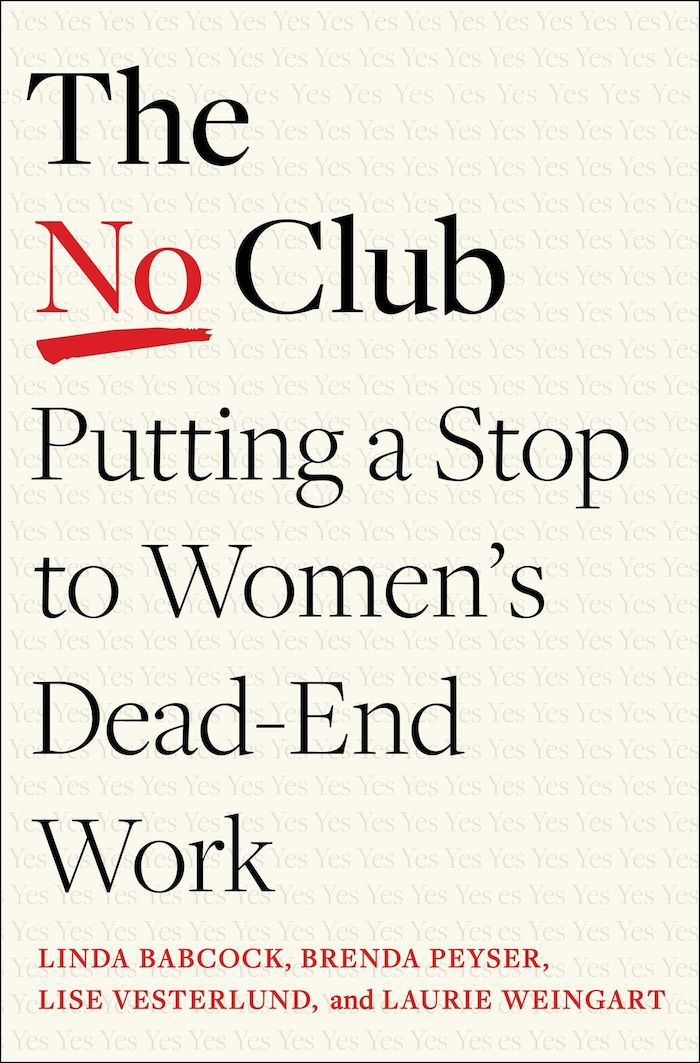- Tags:: 📚Books , ✍️ Sin machirulos hay paraiso. Una charla heterofriendly sobre management
- Author:: Linda Babcock, Brenda Peyser, Lise Vesterlund, Laurie Weingart
- Liked:: 6
- Link:: The No Club
- Source date:: 2022-05-03
- Finished date:: 2023-02-01
- Cover::

Why did I want to read it?
In preparation of ✍️ Sin machirulos hay paraiso. Una charla heterofriendly sobre management
What did I get out of it?
CHAPTER 2 What Are Non-Promotable Tasks?
A non-promotable task matters to your organization but will not help you advance your career. (View Highlight)
The No Club’s Top Ten NPTs:
- Helping others do their work and filling in when people are absent
- Organizing and coordinating (but not managing) the work of others
- Editing, proofreading, and compiling, especially the work of others
- Logistical planning and special events
- Governance work, such as safety committees, ethics committees, diversity committees, climate committees, and review committees
- Recruiting
- Resolving conflict among coworkers
- Helping coworkers with their personal problems
- Onboarding, training, and mentoring
- Office housework such as getting coffee and cleaning (View Highlight)
CHAPTER 3 Women Are Burdened with Non-Promotable Tasks
Every study we conducted and/or reviewed showed what we suspected: women do significantly more non-promotable work than men do. It doesn’t matter what type of organization or job title—across the board, the gender divide persists (View Highlight)
The median senior woman spent the same amount of time on promotable tasks as the median senior man. She just worked more total hours to make room for her excessive load of non-promotable work. This is likely why the senior women were still with the firm. They understood that they had to work extra hours to succeed. (View Highlight)
The Center for WorkLife Law’s study of over three thousand engineers found similar differences in employees’ beliefs about their load of promotable and non-promotable tasks. They asked respondents about their experiences in the workplace regarding work assignments, and the results are presented in the graph below.
(View Highlight)
4. Why do women say yes?
for him, there were no consequences for declining (View Highlight)
Why did women volunteer more than men? Some of our fellow researchers conjectured that women volunteered for faculty senate because they were better at it. We can discard that explanation for our experiment; women and men were equally good at clicking the button. Others suggested that women “enjoyed” the work more than men did—and here it seems bizarre to argue that women “enjoyed” pushing a button more than men did, so we can rule out that explanation as well (…) It’s not that men don’t know how to click a button—they just don’t do it when the women are around (View Highlight)
In a mixed-gender group, we—men and women alike—expect women to do the undesirable tasks (View Highlight)
Women Feel Guilty When They Say No—Because We Expect Them to Say Yes (View Highlight)
Women Experience Backlash When They Say No—Because We Expect Them to Say Yes (View Highlight)
5. Why do women get asked?
Reason #1: We Ask People We Expect Will Say Yes (View Highlight)
Reason #2: When We Think about Who Is “a Good Fit” for Non-Promotable Work, Women “Come to Mind” More Easily (View Highlight)
gender congruence, which captures how good a fit there is between a situation (or job) and a person of a particular gender (View Highlight)
Reason #3: Women Are Victims of Their Own “Success” (View Highlight)
6. The cost of non-promotable work
Work/Work Imbalance Can Undermine Your Perception of Your Professional Identity and Competence (View Highlight)
One study found that female engineer interns were “too often relegated to ‘female’ roles of note-taker, organizer or manager,” and that this caused them to question whether they wanted to become engineers (View Highlight)